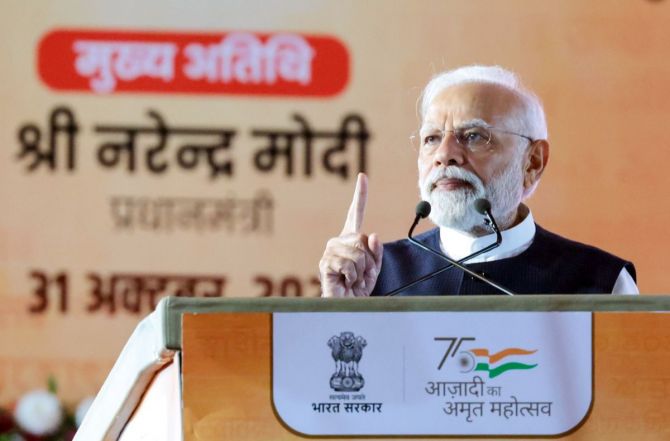We should reassess what India's role in the world is and whether we are doing the right thing for ourselves, notes Aakar Patel.

India abstained from calling for an end to violence in Gaza to avoid upsetting America.
India was told by the new Maldives leader to remove our soldiers from that country.
Qatar sentenced eight Indian Navy veterans to death.
Sri Lanka allowed a Chinese spy ship to dock in Colombo despite India's objections.
Bhutan said it was about to conclude boundary negotiations with China, including on Doklam.
Nepal cannot use its new Gautam Buddha airport because India doesn't allow overflight of large planes.
Canada said it would not be able to normalise visas for Indians till 2024.
These things happened in the space of a few days.
All South Asian nations except India voted to end the violence in Gaza, including Nepal, Sri Lanka and Bhutan, which traditionally votes with India.
The 70 Indian military personnel in the Maldives who will now return maintain radar stations and surveillance aircraft, and Indian warships help patrol Maldives' exclusive economic zone.
The reason we have been told to go is that the Maldives wants to favour China.
Whether we are running a successful foreign policy, as fans of the foreign minister believe, or we are ruining India's global reputation, as some of us think we are doing, is not important to debate.
This is because views are set in stone since we are in the tenth year of the Modi years and there is sufficient evidence to convince someone one way or another.
What is more interesting is to examine what the Modi government's foreign policy actually is and what it is intended to achieve.
In 2014, the BJP manifesto said it would 'strengthen SAARC' and India's states 'will be encouraged to play a greater role in diplomacy'.
For instance, Punjab, which overwhelmingly suffers when Canada visas are affected, would caution Delhi on foreign policy.
In 2019, both these references were eliminated. No fresh text replaced it, but those who study foreign policy praised a new approach that they saw coming together.
This approach comes from a series of speeches made by EAM S Jaishankar on things as diverse as China's rise to power, India's lost decades, the Mahabharata, maritime power and the Covid pandemic.
These assorted speeches were compiled into a book, called The India Way: Strategies for an Uncertain World. What are these strategies?
First, Jaishankar assumes that the US and Europe will continue to look inward (his book was published just before Trump lost), while China would continue to rise.
This would open the space for countries like India to be opportunistic in their engagements with the world and they did not need consistency.
What India wanted was a 'multi-polar Asia' -- meaning one in which India could claim parity with China.
Many balls would need to be kept in the air (Jaishankar has a fondness for stock phrases) and India would handle them with dexterity.
This was opportunism but that was all right because opportunism was India's culture.
The Mahabharata's lessons, Jaishankar says, are that deceit and immorality are merely to 'not play by the rules'.
Drona's demanding of Eklavya's thumb, Indra's appropriation of Karna's armour, Arjuna using Shikhandi as a human shield, these were but 'practices and traditions'.
Inconsistency in policy was not only fine but required because 'obsessing about consistency' made little sense in changing circumstances.But what was such a doctrine to be called?
In a speech he made where he first laid out this doctrine of opportunism and inconsistency, Jaishankar said it is hard to give it a name.
He takes up and discards the phrases -- 'multi-alignment' ('sounds too opportunistic') and 'India first' ('sounds self centred').
He settles at 'advancing prosperity and influence', which he says is accurate but admits is not catchy.
He believes some name for it will eventually come if it is pursued long enough, because part of the challenge is that we are still in the early phase of a major transition.
Perhaps that is so.
Another reason that he was unable to come up with a name for it as clean and understandable as, say, 'non-alignment', could be that this was no real foreign policy at all.
The problems that have been listed at the top of this article reflect this lack of coherence and effectiveness.
Buying cheap Russian oil when nobody is stopping you from doing so is not a foreign policy, but it was praised as being that.
A rotating presidency of the G20 was not an achievement, but that is how it was sold to Indians.
What interested the prime minister, and what made for pageant and ceremony, was being passed off as something meaningful.
It is not easy to escape the conclusion that Jaishankar provided the sophistry to cover what was essentially random and directionless Modi behaviour passing off as foreign policy strategy.
Jaishankar says that this nameless policy of his is intended to achieve four outcomes.
Greater prosperity at home; Peace on the borders; Protection of Indians; Enhanced influence abroad.
Once again, there is no point is going through what is happening on the borders or on prosperity.
The issue is whether, having examined what we have tried to achieve and looking at what results around us, we should reassess what India's role in the world is and whether we are doing the right thing for ourselves.
Aakar Patel is a columnist and writer and you can read Aakar's earlier columns here.
Feature Presentation: Aslam Hunani/Rediff.com











 © 2025
© 2025